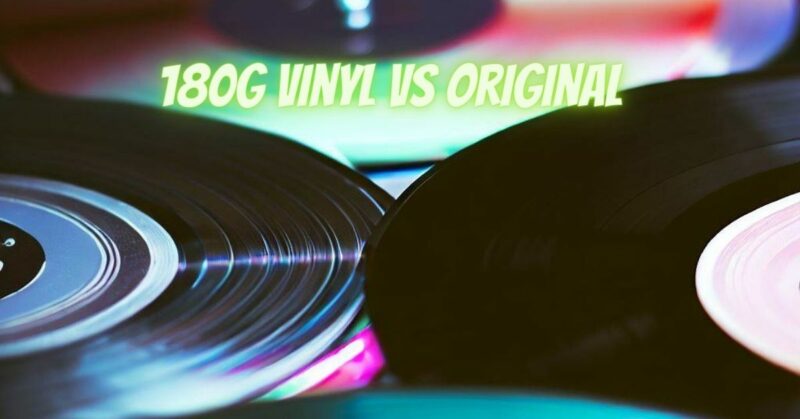Vinyl records have made a remarkable resurgence in recent years, with both newcomers and audiophiles seeking the distinctive analog warmth and tangible experience they offer. However, a debate persists among vinyl enthusiasts: Does the weight of the vinyl, particularly 180-gram pressings, make a difference in sound quality when compared to original, standard-weight records? In this article, we will explore the differences between 180g vinyl and original pressings to determine which one might sound the best for your listening preferences.
1. The Significance of Vinyl Weight:
Vinyl records come in various weights, with 180g records being significantly heavier than standard pressings, which typically weigh around 120g. The weight of the vinyl affects the thickness and durability of the record but does not necessarily guarantee superior sound quality.
2. Durability and Resistance to Warping:
One advantage of 180g vinyl is its greater thickness, which makes it less prone to warping and damage compared to thinner records. This durability can be particularly beneficial for records that see frequent use.
3. Less Surface Noise:
Thicker vinyl records can produce less surface noise and crackle during playback. The additional weight contributes to better tracking and stability of the stylus in the grooves, resulting in a quieter listening experience.
4. Warmer Bass Response:
Some audiophiles argue that 180g vinyl pressings can offer a slightly warmer and more robust bass response compared to standard-weight records. This can be especially noticeable on high-quality audio systems.
5. Original vs. Reissues:
When comparing 180g vinyl to original pressings, it’s essential to consider the overall quality of the pressing and the source material. Many modern 180g reissues are sourced from high-resolution digital masters, while original pressings were typically sourced from analog tapes. Purists often argue that original analog pressings capture the true essence of the recording.
6. Mastering and Production Quality:
The mastering and production quality play a critical role in sound quality. A well-mastered 180g vinyl reissue can sound exceptional, offering a high-fidelity listening experience. Conversely, a poorly produced 180g pressing may not live up to expectations.
7. Personal Listening Preferences:
Ultimately, the choice between 180g vinyl and original pressings depends on personal listening preferences. Some collectors value the authenticity and historical significance of original pressings, while others prioritize the durability and potentially superior audio quality of 180g reissues.
8. Availability and Rarity:
Original pressings of certain albums can be rare and costly. In such cases, 180g reissues can provide an accessible way to enjoy the music without breaking the bank.
9. Audiophile Considerations:
Audiophiles often appreciate the added weight and potential improvements in sound quality that 180g vinyl offers. However, the quality of the source material, mastering, and production process remains critical factors in achieving superior audio fidelity.
10. The Subjective Nature of Sound:
It’s essential to remember that sound quality is highly subjective. What sounds best to one listener may not be the same for another. The best choice between 180g vinyl and original pressings ultimately depends on your individual preferences and priorities as a listener and collector.
The choice between 180g vinyl and original pressings ultimately comes down to personal taste and priorities. While 180g vinyl can offer benefits such as durability, reduced surface noise, and potentially enhanced bass response, it’s essential to consider factors like mastering, production quality, and the authenticity of original pressings. In the end, the “best” sound is a matter of individual preference, and both 180g vinyl and original pressings have their place in the world of vinyl collecting and audio enjoyment.


